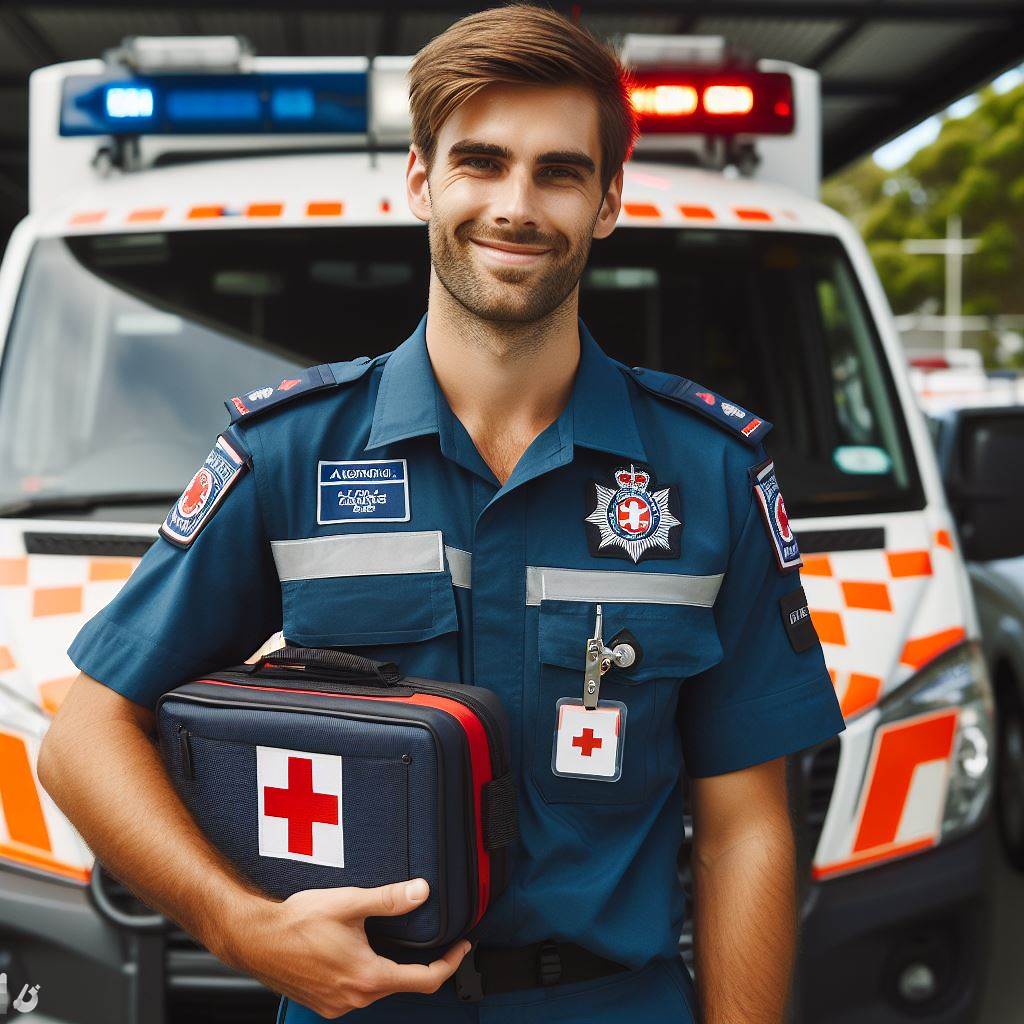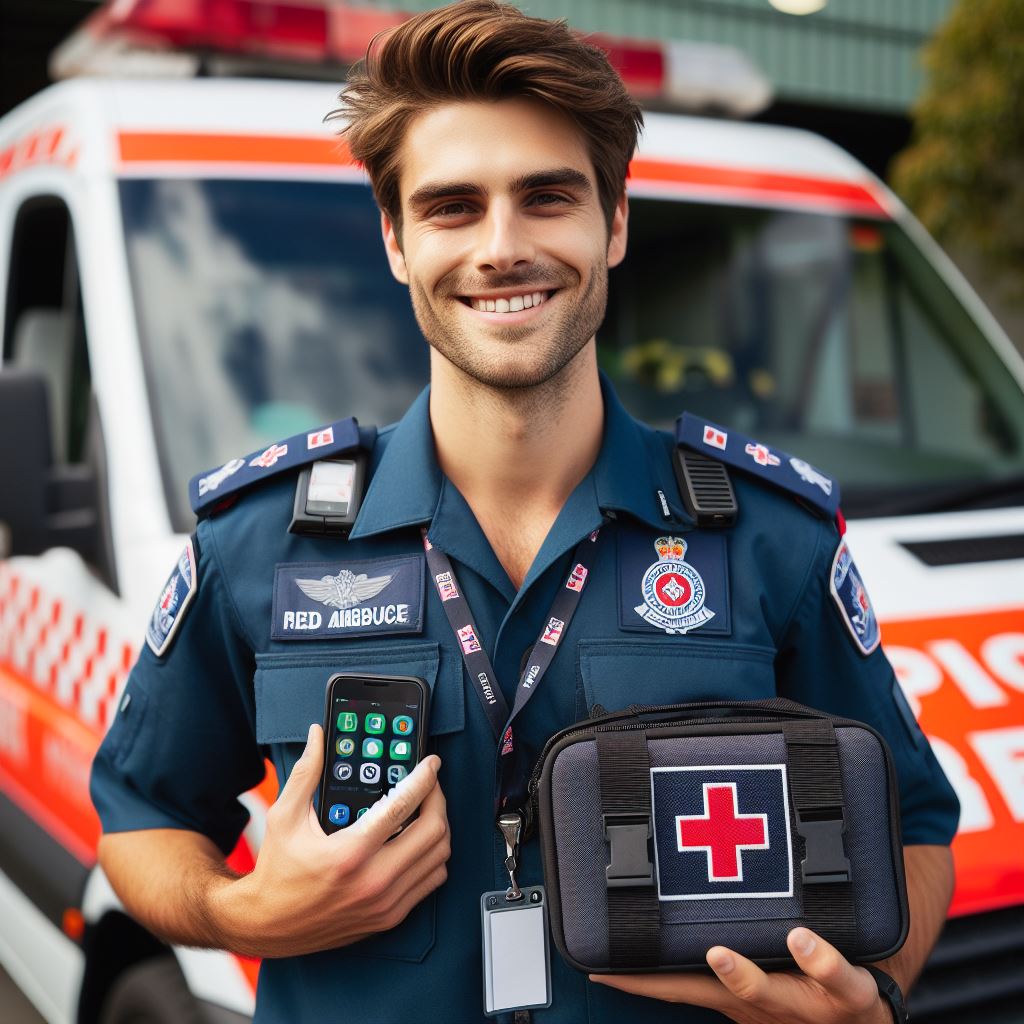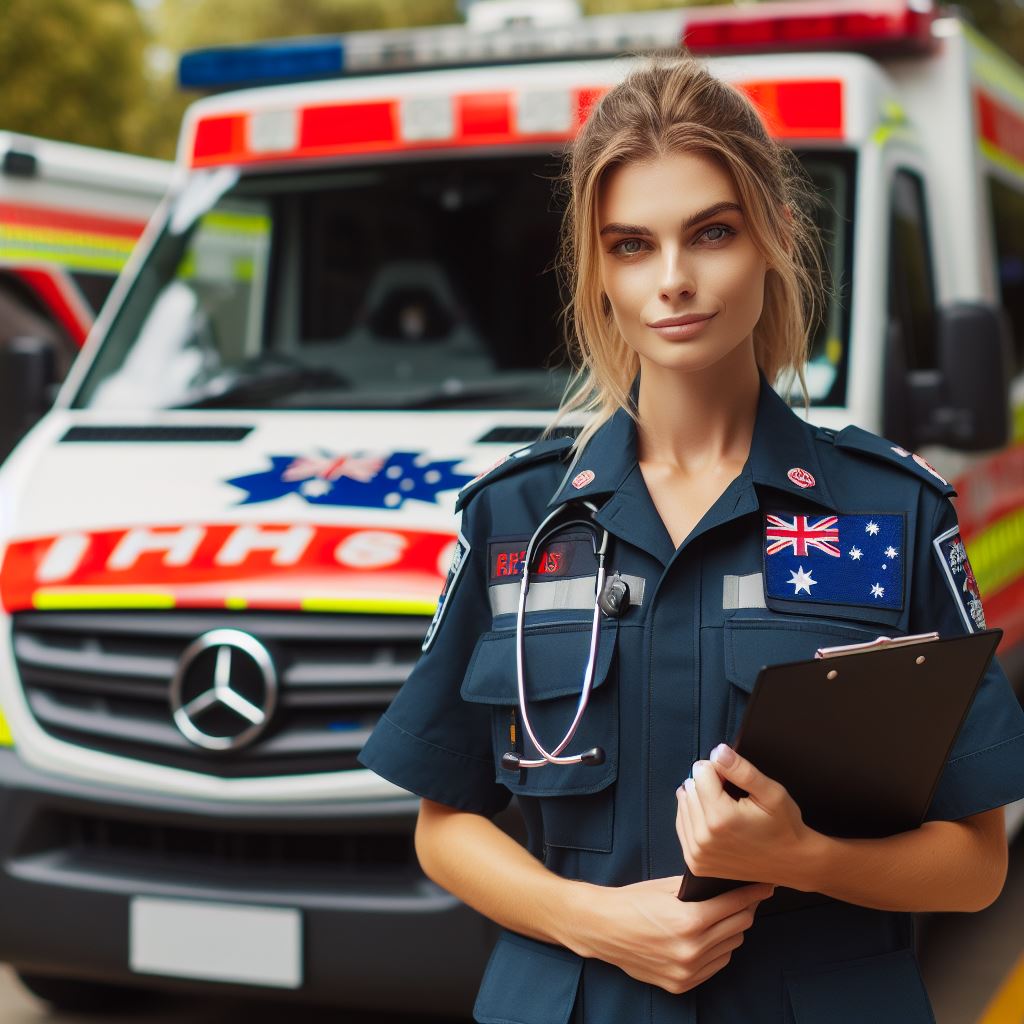Introduction
During the COVID-19 pandemic, Aussie paramedics played a crucial role in the healthcare system. Their experiences and challenges are worth exploring in-depth.
This blog post will delve into the highs and lows they encountered, shedding light on their immense dedication and bravery.
The role of Aussie paramedics cannot be overstated, especially during a global health crisis like COVID-19.
These frontline heroes tirelessly served their communities, responding to emergency calls, administering life-saving treatments, and transporting patients to hospitals.
In this blog post, we will delve into the experiences of Aussie paramedics, providing insights into their day-to-day challenges and the impact of coronavirus on their profession.
We will explore the emotional and physical toll it took on them as they risked their lives to save others.
Additionally, we will examine the training and preparations that paramedics underwent to adapt to the new demands brought about by the pandemic.
Their ability to quickly learn and implement new protocols was vital in ensuring their own safety and that of the patients they cared for.
Furthermore, we will shed light on the mental health struggles encountered by paramedics.
The pandemic brought increased stress and anxiety, and we will discuss the steps taken to support their well-being and cope with the overwhelming demands of the job.
This blog post aims to retrospectively showcase Aussie paramedics’ COVID-19 experiences, emphasizing their vital healthcare role and acknowledging dedication and sacrifices.
Stay tuned for an eye-opening and inspiring exploration of their journeys.
The Role of Paramedics During COVID-19
A. Paramedics at the forefront of the pandemic response
- Paramedics have played a crucial role in the fight against COVID-19.
- They have been at the forefront of the pandemic response, working tirelessly to save lives.
- Paramedics have been the first line of defense, responding to emergency calls and providing immediate medical care.
- They have been instrumental in identifying and isolating potential COVID-19 cases, minimizing the virus’s spread.
- Paramedics have been true heroes, risking their lives to keep the community safe.
B. Responsibilities in treating and transporting COVID-19 patients
- Paramedics have had to adapt their protocols to ensure the safety of both themselves and their patients.
- They have followed strict guidelines to minimize the risk of infection and to provide proper care.
- Paramedics have been trained to recognize COVID-19 symptoms and provide appropriate medical interventions.
- They have been responsible for the proper handling and transportation of COVID-19 patients to hospitals or designated medical facilities.
- Paramedics have worked closely with other healthcare professionals to ensure seamless patient transfers and continuity of care.
C. Challenges faced in providing emergency care during this time
- Paramedics have faced numerous challenges in providing emergency care during the COVID-19 pandemic.
- They have had to adapt to rapidly changing circumstances and guidelines.
- Paramedics have experienced shortages of personal protective equipment (PPE), putting themselves at risk.
- They have been subjected to increased workloads and long shifts due to the surge in COVID-19 cases.
- Paramedics have also faced emotional and mental strain from witnessing the devastating impact of the virus.
Basically, paramedics have been the unsung heroes of the COVID-19 pandemic.
They have fearlessly faced the challenges posed by the virus, adapting their practices to keep themselves and their patients safe.
Despite the risks and hardships they have encountered, they have remained dedicated to their duty of saving lives.
Their role in identifying, treating, and transporting COVID-19 patients has been invaluable in controlling the spread of the virus.
We owe a debt of gratitude to paramedics for their unwavering commitment to serving their communities during these challenging times.
Read: Healthcare Admin Roles: What You Need to Know
Safety Measures for Paramedics
In the face of the global COVID-19 pandemic, paramedics have found themselves at the forefront of the battle against this deadly virus.
As they respond to emergency situations, their safety becomes a paramount concern.
In this section, we will discuss the safety measures implemented to protect paramedics from COVID-19.
A. Safety Protocols
- Strict adherence to social distancing guidelines to minimize exposure to the virus.
- Regular screenings and health checks to identify any potential symptoms among paramedics.
- Thorough sanitization of ambulances and equipment after each call, reducing the risk of contamination.
- Implementation of a contact tracing system to quickly identify and isolate any paramedic who may have been exposed to the virus.
- Establishment of dedicated COVID-19 response teams to ensure specialized care for patients.
- Continuous monitoring of local outbreaks to adjust protocols and respond effectively.
B. Personal Protective Equipment (PPE)
The use of Personal Protective Equipment (PPE) plays a crucial role in safeguarding the health and well-being of paramedics on the frontlines.
Your Personalized Career Strategy
Unlock your potential with tailored career consulting. Get clear, actionable steps designed for your success. Start now!
Get Started- N95 respirators, providing a higher level of filtration and protection against airborne particles.
- Gloves, protecting the hands from direct contact with the virus and contaminated surfaces.
- Protective gowns or coveralls, shielding paramedics from potential exposure to bodily fluids.
- Face shields or goggles, providing additional protection for the eyes from respiratory droplets.
- Disposable shoe covers, preventing the spread of the virus through contaminated footwear.
Regular training on the correct usage and disposal of PPE is provided to paramedics to ensure their safety.
C. Training and Guidelines
Paramedics undergo specific training to handle situations involving COVID-19, following guidelines provided by health organizations and government agencies.
- Identification and assessment of COVID-19 symptoms in patients requiring emergency medical assistance.
- Proper donning and doffing of PPE to minimize the risk of self-contamination.
- Effective communication techniques to provide instructions and gather critical patient information while wearing PPE.
- Safe transport and handling of COVID-19 positive patients to minimize the risk of transmission.
- Decontamination procedures for ambulances and equipment after transporting infected patients.
Strict adherence to these guidelines ensures the safety of paramedics and reduces the risk of virus transmission to both the paramedics and the patients they serve.
Generally, the safety of paramedics is of utmost importance during the COVID-19 pandemic.
By implementing stringent safety protocols, providing essential PPE, and offering specialized training, the risks faced by paramedics in their noble pursuit to save lives are minimized.
Their dedication and commitment in the face of adversity are truly commendable as they continue to serve their communities selflessly.
Read: A Day in the Life of a Healthcare Admin in Australia
Psychological Impact on Paramedics
Paramedics have been at the forefront of the battle against COVID-19, facing numerous challenges and risking their lives to save others.
However, the pandemic has taken a severe toll on their mental health, causing increased levels of stress, anxiety, and burnout.
A. The Psychological Toll of the Pandemic
- The constant exposure to the virus and the risks associated with it have significantly impacted the mental well-being of paramedics.
- Witnessing the suffering and loss experienced by patients on a daily basis can lead to emotional distress.
- Paramedics often face difficult ethical decisions, such as resource allocation, which can result in moral injury and psychological trauma.
These factors have contributed to a substantial increase in stress levels among paramedics, leading to various mental health issues.
B. Stress, Anxiety, and Burnout
- Paramedics have been working long hours, often without breaks, to provide care to COVID-19 patients.
- The fear of contracting the virus and spreading it to their loved ones weighs heavily on their minds.
- Many paramedics have had to witness patients dying alone due to restrictions on visitors, causing immense emotional strain.
- The constant pressure and workload have led to burnout, resulting in exhaustion, detachment, and decreased job satisfaction.
C. Support Systems and Initiatives
- Recognizing the psychological impact on paramedics, various support systems and initiatives have been put in place.
- Critical Incident Stress Debriefing (CISD) programs allow paramedics to discuss traumatic events and receive emotional support.
- Peer support networks provide a safe space for paramedics to share their experiences and seek advice from colleagues who understand their challenges.
- Counselling services are readily available to paramedics to help them cope with the emotional toll of the pandemic.
Mental health resources and training programs have also been implemented to raise awareness and equip paramedics with coping strategies.
D. The Importance of Addressing Mental Health Needs
Addressing the psychological impact on paramedics is crucial, as failing to do so can have detrimental effects on their well-being and the quality of patient care.
- Providing access to mental health services ensures that paramedics receive the support they need to navigate the challenges they face.
- Creating a culture that encourages open discussions about mental health can help reduce the stigma surrounding seeking help.
- Implementing adequate rest breaks and workload management strategies can alleviate stress and prevent burnout among paramedics.
By prioritizing the mental health of paramedics, we can ensure their well-being while enabling them to continue saving lives on the frontlines of the pandemic.
The COVID-19 pandemic has taken a significant toll on the mental health of paramedics.
The stress, anxiety, and burnout experienced by these frontline healthcare workers emphasize the importance of providing adequate support systems and initiatives.
By addressing their psychological needs, we can support paramedics in navigating these challenging times and continuing their lifesaving work.
Read: Aussie Paramedics: Career Growth Prospects

Find Out More: Rural vs Urban Public Health in Australia
Explore Further: Women in Paramedicine: Australian Perspective
Stand Out with a Resume That Gets Results
Your career is worth more than a generic template. Let us craft a resume and cover letter that showcase your unique strengths and help you secure that dream job.
Get HiredCollaboration with Other Healthcare Professionals
In the relentless battle against COVID-19, Aussie paramedics stood at the forefront, their collaboration with other healthcare professionals proving pivotal.
A. Importance of Collaboration
- Dynamic Expertise Integration: Collaborating with nurses, doctors, and specialists ensures a fusion of diverse skills.
- Holistic Patient Care: By working together, healthcare professionals address not just immediate concerns but also long-term health implications.
- Resource Optimization: Collaborative efforts prevent duplication of resources, maximizing efficiency in the face of overwhelming demand.
B. Necessity of Effective Communication
- Real-time Information Exchange: Swift and accurate communication between paramedics and healthcare professionals facilitates timely decision-making.
- Treatment Consistency: Clear communication ensures that the treatment plan aligns seamlessly across various healthcare settings.
- Adaptability: As the situation evolves, effective communication enables paramedics to adapt quickly, ensuring patient care remains uninterrupted.
C. Successful Collaboration Stories
- Mobile Testing Units: Paramedics collaborated with public health officials to set up mobile testing units, reaching remote communities efficiently.
- Telemedicine Integration: Seamless collaboration with telehealth services allowed paramedics to consult with specialists, ensuring patients received expert guidance.
- Training Initiatives: Joint training programs between paramedics and healthcare professionals enhanced the collective skill set, preparing the healthcare system for future challenges.
The success of these collaborations hinged on a shared commitment to patient well-being.
Aussie paramedics, working hand-in-hand with other healthcare professionals, exemplified the power of unity in the face of a global crisis.
To sum it up, the COVID-19 pandemic underscored the irrefutable importance of collaboration among healthcare professionals.
As we reflect on the challenges faced and victories achieved, one thing is clear – it is through collaborative efforts that we can forge a resilient and responsive healthcare system, capable of overcoming any adversity.
Read: Internship Insights: Becoming an Aussie Paramedic
Delve into the Subject: Rural Paramedicine in Australia: Unique Aspects
You Might Also Like: Specializations in Nursing: Options in Australia
Lessons Learned and Future Considerations
A. Lessons learned from the experiences of Aussie paramedics during the pandemic
- Adaptability was essential as paramedics had to quickly learn new protocols and procedures.
- Prioritizing the safety of both patients and paramedics was crucial during the crisis.
- Communication played a vital role in coordinating efforts among paramedic teams and healthcare facilities.
- The importance of effective triage became evident as resources became limited.
- Paramedics experienced high levels of stress and emotional toll due to the increased workload and risk of exposure.
- Working collaboratively with other healthcare professionals was necessary to provide comprehensive care.
- Paramedics faced challenges in implementing infection control measures while delivering critical care.
- Managing personal protective equipment (PPE) supply and distribution was a significant concern.
- Adhering to strict hygiene practices both during and after patient care proved essential in preventing transmission.
- Providing mental health support for paramedics dealing with traumatic situations became imperative.
B. Changes or improvements to be made to better prepare for future outbreaks or emergencies
- Developing comprehensive pandemic response plans can help paramedics be better equipped in the future.
- Investing in advanced technology and telehealth capabilities can enhance remote patient assessment and monitoring.
- Improving interoperability between different healthcare systems and sharing of real-time data can aid in coordinated responses.
- Regularly reviewing and updating infection control protocols and equipment guidelines is crucial.
- Increasing the availability of specialized training in disaster response and pandemic management can prepare paramedics.
C. The need for continuous training, resources, and support for paramedics in such situations
- Ensuring ongoing education and training in the latest pandemic management strategies is essential.
- Providing adequate resources such as sufficient PPE, medications, and medical equipment is vital.
- Establishing mental health programs that offer counseling and mental well-being support for paramedics is critical.
- Recognizing the efforts and sacrifices made by paramedics by offering appropriate incentives and support.
- Developing a network of peer support and debriefing sessions to address the emotional toll experienced by paramedics is crucial.
Ultimately, the experiences of Aussie paramedics during the COVID-19 pandemic have highlighted significant lessons and considerations for the future.
Adaptability, prioritizing safety, effective communication, and collaboration played key roles.
Changes and improvements in pandemic response plans, technology, and training are necessary.
Continuous support, resources, and mental health programs are vital for paramedics facing such crises.
By learning from these experiences, we can better prepare and protect both paramedics and the community in future outbreaks or emergencies.
Uncover the Details: Public Health vs. Clinical Care in Australia
Gain More Insights: Latest Tech in Aussie Medical Technician Field
Conclusion
This blog section highlighted the significant role of Aussie paramedics during the COVID-19 pandemic.
They have been on the front lines, facing numerous challenges, and yet they have shown unwavering dedication and commitment to saving lives.
Throughout the retrospective analysis, it is evident that paramedics played a crucial role in providing emergency medical care, ensuring the safety of patients, and mitigating the spread of the virus.
Amidst the unprecedented circumstances, Aussie paramedics remained resilient and adaptable, constantly learning and implementing new protocols to provide the best possible care.
They have demonstrated exceptional courage and professionalism, working tirelessly to support their communities and protect public health.
Transform Your LinkedIn for Maximum Impact
Elevate your professional brand with a LinkedIn profile that attracts recruiters, showcases your expertise, and maximizes opportunities. Stand out in your industry with a profile built for success.
Boost ProfileIt is crucial to reiterate the appreciation and gratitude for the selfless service of Aussie paramedics.
Their tireless efforts have undoubtedly saved countless lives and provided reassurance during uncertain times.
Their bravery and dedication deserve acknowledgment and praise.
As the world continues to battle the ongoing pandemic, it is important to recognize the essential role played by these frontline heroes.
They serve as a reminder of the selfless individuals who are willing to put themselves in harm’s way to help others.
Let us express our deepest gratitude to Aussie paramedics for their sacrifices and the invaluable contributions they have made in fighting against COVID-19.
In the end, Aussie paramedics have been true heroes throughout this challenging period. Their unwavering commitment, professionalism, and bravery should serve as an inspiration to all.
They are the epitome of selflessness, and without a doubt, our gratitude for their dedicated service knows no bounds.




